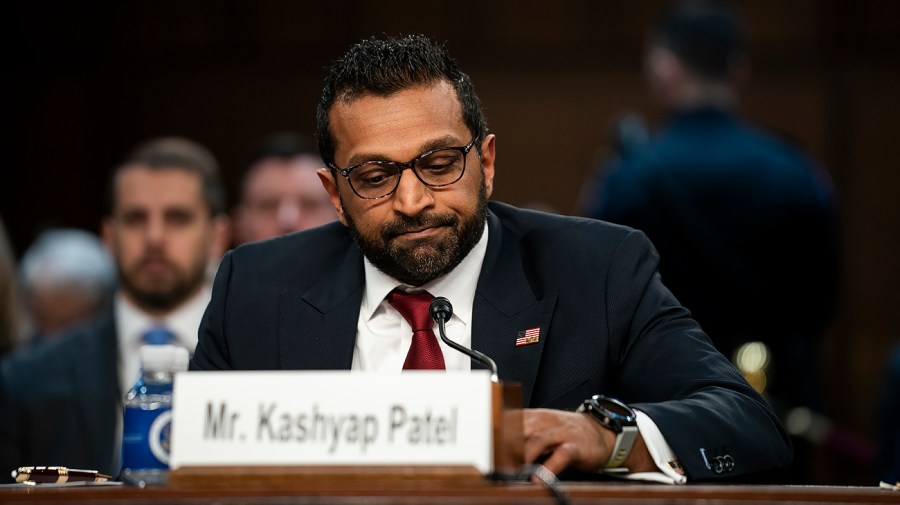
With a tie-breaking nod from Vice President JD Vance, President Trump got away with Pete Hegseth, a defense secretary short on qualifications and long on disqualifying personal baggage. Senate Minority Leader Chuck Schumer (D-N.Y.) called him “one of the most erratic, unqualified, and unfit Cabinet nominees we have ever seen in modern times.”
Hopefully, there will be someone in the Pentagon to push back against erratic defense policies that compromise our national security.
But Robert F. Kennedy Jr., Kash Patel and Tulsi Gabbard, nominated to oversee public health, the FBI and national intelligence, are unqualified, unprincipled and untethered. This is really terrifying.
Kennedy is Trump’s anti-vaccine nominee for Secretary of Health and Human Services. In addition to administering the country’s Medicare and Medicaid programs, HHS has in its portfolio the National Institutes of Health, the Centers for Disease Control and the Food and Drug Administration. This is our center for scientific research and delivery of healthcare to all Americans.
Sen. Sheldon Whitehouse (D-R.I.), appreciating that the general welfare is on the line, told Kennedy, “Frankly, you frighten people.” No wonder. One of those “people” might include his cousin Caroline Kennedy, who said she had known Bobby her whole life and damned him in a letter to the Senate as a “predator” lacking “any relevant government, financial, management, or medical experience.” She wrote, “His views on vaccines are dangerous and willfully misinformed.”
Putting someone like Kennedy in charge of the nation’s health care establishment is recklessly dangerous. Americans could die without access to the latest scientific advances. Children could die without access to safe and effective vaccines.
Trump wants Kash Patel to head the FBI. Suffice it to say, J. Edgar Hoover, he is not. In his opening remarks, Sen. Chuck Grassley (R-Iowa) told Patel, “Public trust in the FBI is low. Only 41 percent of the American public thinks the FBI is doing a good job … Mr. Patel, it’ll be your job to restore the public’s trust and return the FBI to its core mission of fighting crime.”
Some chance. Patel is all political vengeance. Before the committee, Patel lacked candor and credibility, straining to describe his past and accurately characterize his alleged accomplishments.
Sen. Dick Durbin (D-Ill.) called Patel “a staunch Trump loyalist who has repeatedly peddled false conspiracy theories and threatened to go after President Trump’s enemies.” Patel switched positions, claiming he doesn’t have an “enemies list” — in fact, he published such a list as an appendix in a 2023 book — and that he wouldn’t launch revenge investigations. Patel may be saying the right thing now with his confirmation on the line, but that hardly restores “public trust in the FBI.”
It’s not just Democrats who have deep reservations about Patel. Trump’s attorney general, Bill Barr, rejected Patel as a possible deputy director of the FBI, stating that Patel would be appointed over “my dead body.” That’s potent medicine coming from Trump’s “hatchet man,” who compromised the necessary independence of Justice Department. And when in his first administration Trump planned to name Patel deputy director of the CIA, Gina Haspel, the agency’s head, threatened to resign.
Patel has a vengeful nature. When a reporter from The Atlantic sought to interview “many of the nearly forty” of Patel’s former colleagues, fearing certain retaliation, they said they would only do so if they could remain anonymous.
Durbin summarized it exceedingly well: “The American people deserve an FBI director focused on keeping our families safe from terrorism, drug trafficking and violent crime, not the checklist of grievances in this book. Mr. Patel, your record makes clear that you are not that person.”
As for Tulsi Gabbard, even the editorial board of Rupert Murdoch’s Wall Street Journal doesn’t like her.
In a sizzling editorial, the Journal faulted Gabbard’s opposition to Section 702 of the Foreign Intelligence Surveillance Act, which permits the government to monitor foreigners abroad without a warrant. The information goes into a database, around 60 percent of which goes into the president’s daily intelligence briefing. In some cases, the intelligence community can run inquiries on U.S. persons under strict guidelines imposed by Congress. This is not left-right issue. It is important national security stuff needed to combat terrorism that has overwhelming bipartisan support.
Gabbard was woefully ignorant of the issues. “Warrants should generally be required before an agency undertakes a U.S. person query,” she told the Senate in writing, “except in exigent circumstances.” She underscored that view in response to a question from Sen. Ron Wyden (D-Wisc.).
Gabbard got turned around. Her argument was identical to that made by far-left Democrats, which Congress rejected. The Journal editorial board believes correctly that the time involved in getting a warrant requiring court approval would impede the government in monitoring terrorist threats in real time. While the agents and the lawyers are dithering, the clock is ticking on the time bomb, or the plane is being hijacked and jetting towards its target.
Gabbard didn’t have a clue. When Sen. John Cornyn (R-Texas) asked her what she would tell a judge to establish probable cause for a warrant, she had no answer, lamely protesting that “this is the center of the debate.”
All this — on top of Gabbard’s sanguine view of Putin’s invasion of Ukraine and her links to Assad’s Syria — make her nomination a nonstarter. The Journal said it well: “The Senate can do Mr. Trump, and the country, a favor by rejecting a director of national intelligence who doesn’t understand the vital tools of the job.”
If I am frightened by these nominees, like so many other people, there is certainly an abundance of probable cause.
James D. Zirin, author and legal analyst, is a former federal prosecutor in New York’s Southern District. He is also the host of the public television talk show and podcast Conversations with Jim Zirin.












